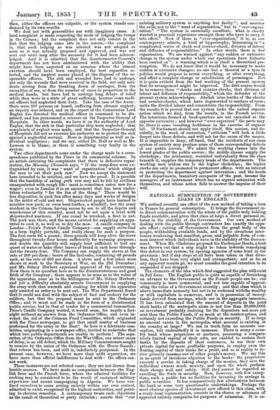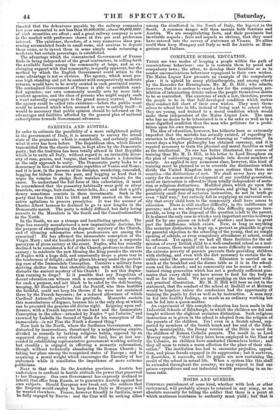NATIONAL SUBSCRIPTION' OF' GOVERNMENT LOANS IN ENGLAND.
vrE noticed recently one effect of the new method oftaking a loan in France by general subscription. It brings the Government in to direct communication with the whole of the public body holding funds available, and gives that class at large a direct personal in- terest in the stability of the Government. Our own method of dealing with the public through contractors has exactly the oppo- site effect ; cutting off Government from the great' body of the people, withholding available funds, and by the circuitous inter- course weakening that manifest, gross, and:palpable form. of- com- mon interest which individuals have-in the stability of the Govern.- ment When Mr. Gladstone proposed his Exchequer Bonds, a hint was thrown out that a step might be taken Inwards remedying. this defect in our system, by opening agencies of some kind in the provinces : but if any, steps at all' have been taken in that direc- tion, they have been very alight and unimportant; and so far as any, apparent results go,. we must consider the-good-intention to be suspended if not dropped. The elements of the idea which_ first suggested the plan still exist in full force. The English public is quite as capablk of fiirnishing, an advance to the Government as the French- people can be ; our community is more commercial, and not less capable of appreci- ating the value of a Government security; and that class which is above immediate necessity but not to be reckoned .withthe wealthy or with capitalists. is. numerous, and is in possession of money- funds derived from savings, which are in the aggregate immense.. It has been calculated' that. the amount-of deposits in- the joint steck banks of the metropolis alone is not less than 20,000,0001: an investment probably realizing for the depositors not more per cent than the Piiblio Funds, if so much at' the market-prioes, and: certainly not exceeding the Public Rinds-in security. If so large an amount exists in the metropolis,, what amount is existing in. the country at large ? We can. in trath.form no accurate con- ception, but undoubtedly it is immense. There is many a coun. try bank whose proprietors or partners, possessing a compara- tively limited capital of their own, are enabled to sustain their banks by the deposits of their customers, ta use their own private capital for more profitable purposes, to employ even the floating capital of their banks for a profit, and' so in reality to de. rive princely incomes out of other people's money. We say this. in no spirit of invidious objection to. the banks : the proprietors execute a service in taking charge or the monies,. they save the individual owners much anxiety, and upon the whole perform their charge well and safely. Still they cannot be regarded" as, excelling the State in security. Now, however-, with few.exeep- dons, such a public has no facilities for investing its savinge in public securities. It has comparatively few alternatives between the bank or some very questionable undertakings. Perhaps the most obvious species of investment now offered, to this class, with a ready local representation, consists in the. shares or advances of approved railway companies for purposes of extension. It is es-,
timated that the debentures payable by the railway companies last year amounted to not less than 20,000,0001.; about 80,000,000/. of such securities are afloat ; and a great railway company is now in the market with preference shares at five per cent preference interest. The existence, therefore, of a very numerous class pos- sessing accumulated funds in small sums, and anxious to deposit those sums, or to invest them in some simple mode returning a moderate but certain percentage, is established. The advantage which the concentrated Government of France finds in being independent of the great contractors, in calling forth the available funds among the community at large, and so ex- changing support with that community, is equally apparent, but the method by which the English Government could attain to the same advantage is not so obvious. The agency, which must pos- sess high standing and yet be content with comparatively moderate returns, would have to be newly created in each provincial centre. The centralized Government of France is able to establish rami- fied agencies; our own community usually acts by more inde- pendent agencies, and the class of persons who might supply such a want naturally congregate to the grand money centres. Before the agency could be called into existence—before the public want could be aroused which when aroused is sure to satisfy itself—it would be necessary that public opinion should be informed on the advantages and facilities afforded by the general plan of national subscriptions towards Government advances.































 Previous page
Previous page